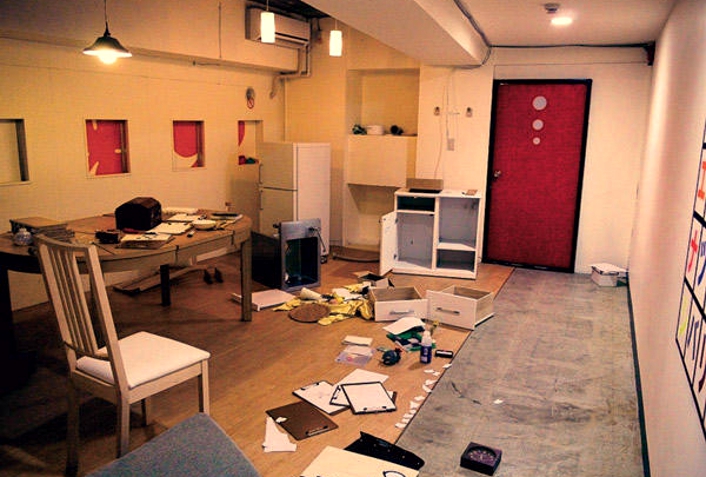Would you work for a company that produces weapons? You’re there assembling guns and rifles, that will be used in wars to kill soldiers but probably also many civilians, and many kids. The salary is good and the workplace comfortable though.
 Maybe no, but would you work for that company just as an accountant instead? You’re not there assembling guns physically, but working on a computer in one of their offices, with excel files and stuff like that. Your labor still contributes to the cause of a company that kills people for business, but you never touch the weapons personally.
Maybe no, but would you work for that company just as an accountant instead? You’re not there assembling guns physically, but working on a computer in one of their offices, with excel files and stuff like that. Your labor still contributes to the cause of a company that kills people for business, but you never touch the weapons personally.
Still no? Ok, then what about cigarettes? Would you work for a company that produces cigarettes? They also offer you a good salary and a comfortable workplace. You’re still working for a company that kills people for business: just very very slowly, and in a way which is socially accepted. Maybe it’s not the creative job you dreamed about… but if the salary is good… maybe you wouldn’t mind, would you?
What about gambling? Would you accept a job where you produce video poker machines? This is much easier to say yes to: your company is not even damaging anyone’s health in this case, it’s just taking advantage of people who are unaware of how the statistics of those machines works. Would a good salary make you be OK with providing your labor to such a company?
Next: would you say yes to a job in the public administration? Here you would work in a typical lazy government office: the job is very stable and a good salary is always granted, whether you work hard or barely. Occasionally you may even have the impression that you’re being productive, but most of the time you realize that your entire office is not doing anything for the society (other than keeping a dozen of employees busy shuffling papers).
The penultimate proposal is working for a restaurant that serves high quality food: tasty, healthy and produced sustainably. You’re back to the private sector, but this time not only your company is not harmful or unproductive, it’s even producing some value for the society (the high quality food). In this case however the salary is only mediocre, and you have to work a lot. How do you feel about this proposal? Does it attract you more or less than the previous ones?
And final question: would you work for a nonprofit organization for no salary? No salary means that probably you have to use your extra time to generate income some other way. The organization helps people in need and the environment, but for you individually this means hard work and plenty of difficult situations to face.
Individual action VS global action
As you examined the previous proposals, considering which jobs you would or wouldn’t accept, you noticed that I formulated the questions in a specific way: I didn’t mention only the individual work that you would do (e.g. assembling guns) or the individual conditions that you would get (e.g. good salary), I also remarked the global action that your company would do in the society, thanks also to the contribution of your labor.
This is an important point of view that is rarely considered. When it comes to evaluating a job, often we are educated to adopt a restricted perspective: we only look at the office we are in, and at the colleagues we have around. And if in this small bubble our personal conditions (salary, workplace) are good, then the job is “good”. But we rarely include in our evaluations the entire entity: the company we work for. If we give our labor to it… what are we helping it doing? What kind of impact does our company have in the world?
I’m sure that many of us would be averse if proposed directly to assemble guns (especially knowing that they will be used to kill kids), however my impression is that at the same time we’re often in a situation that is similar to the situation of the accountant: we are in a work environment that apparently is professional and inoffensive, so we don’t realize that indirectly we’re helping some larger entity have a negative impact in the world.
Broadening the perspective and considering the larger entity is necessary to determine our work ethic, because it’s the starting point to decide how much we are willing to compromise in order to maintain personal benefits.
Personally, as an example, my work ethic tells me not to give my labor to companies whose global action results in the production of unconsciousness. Interestingly, this principle wipes out most of the jobs that exist today, that in my opinion lower both the individual consciousness of the worker and the global consciousness of the environment.
My work ethic also tells me not to give my labor to companies that are unproductive and inefficient, the type of companies that would make me work many hours to produce very little. Knowing how many resources the universe employed for me to be here (food, education… and of course millions of years of evolution 🙂 ) I would feel very bad to use them doing nothing in a lazy office. This second principle wipes out another large number of modern jobs, that seem to me definitely unproductive.
Few examples of jobs that I would very hardly accept because misaligned with these principles would be working for: a bank (parasitic institution that adds zero value to the society), a fast food restaurant (I wouldn’t want to contribute to make people sick), a pharmacy (I prefer to educate people to avoid disease, rather than curing the disease once people have it), a retail store like Zara and H&M (too much focus on appearance, and I really dislike the egotistical attitude that their models wear in the ads), a football stadium (sports like football tend to become mass magnets for unconsciousness), the news on television (propaganda).
And of course I would not work for companies that produce weapons, cigarettes, video poker machines, and I would rather stay away from unproductive government jobs. I may accept one of these jobs only if desperately in need… or maybe if they offered me such a huge salary that I’d feel I could use that salary to contrast these companies more than I would help them with my labor.
Even if definitely a minority, fortunately still many “survivor” jobs exist that pass the test of my work ethic. For example I am generally OK with jobs related to housekeeping, gardening, personal care, farming, tourism, education and art (hopefully at condition that these jobs don’t serve unconsciousness-producing entities as well). Actually I even do some of these jobs occasionally, even if I prefer to focus on other jobs that are my forte AND that produce passive income.
Unethical jobs
I find it rather amusing that today, when someone says that he doesn’t eat meat for ethical reasons, people understand it and are fine with it, but when I say that I don’t have a job for ethical reasons, people look at me weird.
But that’s really one of my main reasons: I would feel really bad having one of the many jobs that are common in the job market today, because no matter how stable the position and how comfortable the workplace, at higher level most of these jobs serve entities like banks, governments, corporations, and these entities create many problems for the society. I don’t want to contribute to create problems.
Even with commerce in general, a large sector that employs the labor of many people, I tend to feel resistance. In my view most shops that exist (physically in the streets, or virtually on internet) sell an impressive amount of unnecessary objects, so working in any of those shops would mean participating to their “bad” cause: materialism. And I really see materialism, a.k.a. the excessive focus on possessing objects, as a big source of unhappiness for people and unconsciousness in general.
Your ethic VS the ethic of your colleagues
A popular Jim Rohn quote is: you are the average of the 5 people you spend the most time with. It makes a lot of sense to me.
If you spend many hours per week in a workplace, can you recognize that you are inevitably influenced by your colleagues? And if your colleagues have -on average- a very different ethic from yours, what are the consequences on you?
I personally experienced a lot of struggle in a previous corporate job for this. It took me awhile to realize that there was a problematic difference between the values that typically circulated in that work environment and my own values. For example, in the relationships with customers, managers and peers, I frequently used to detect a lack of authenticity that bothered me.
Especially in meetings, people were hardly saying what they were really thinking, and lies were a standard practice, for example to avoid admitting responsibilities with delays in completing projects. In those situations, sometimes I would “rebel” and say what I was really thinking anyway, but most times I would get carried in the flow and tell many lies too, to avoid constant arguing. Unfortunately this was influencing also my personal life, in fact I recognized that the number of lies that I was telling in my private sphere was increasing as well, because I was getting used to it.
I think that in general it’s very difficult to maintain integrity and stay loyal to your principles if in your workplace if you see everybody around constantly going against those principles. For example, again in the specific case of authenticity, you can try to be as authentic as you want in your work, but the problem is at the higher level: the type of job itself, the sector in which you are. Some workplaces are inevitably doomed to be pervaded by inauthenticity because they belong to an estabilishment that is inherently based on a lie.
That’s the case, for example, of the entire banking estabilishment, that sits on the lie that paper money is backed up by anything. This lie at the root inevitably reaches all the levels of the estabilishment, from the meetings at the top of the elite bankers, to the relationships among “simple” bank employees at lower levels: in general they will all be more prone to lie than, for example, people who work in farming.
Similarities exist in other sectors: politics (sits on the lie that most politicians work to serve the citizens instead of themselves), mass media news (sits on the lie that they’re produced to inform the audience), advertising (lies are the foundation of the whole business), and so on.
Some sectors in general have a bad karma, so if you work in those sectors -at any level- you put yourself in a situation where your values are constantly challenged. How are you supposed to maintain a strong work ethic there? Wouldn’t it be easier to just migrate to another sector with better karma?
Last questions
I want to end this article just as I started it, with some questions.
What are you available to do for a salary?
If you do have a job, whether you’re working as an employee or as an entrepreneur, what does your company do? What kind of impact does it have in the world: positive, negative, irrelevant? Does your company promote materialism and consumerism, making society more miserable? Does it promote science and art, making society happier?
In which direction is your company pushing, and so in which direction are you also pushing by giving your labor to it? If you’re working inside a comfortable bubble but that bubble is included in a larger bad bubble, is that OK for you? Is it in line with your work ethic?
Does your company add value to the world, subtract value from the world, or maybe it’s not doing anything significant, so whether you and your colleagues go to work each day or not… the outside society wouldn’t even notice the difference?
And those people who accept challenging jobs for nonprofit organizations -without even getting paid-, what is their motivation?
Related: The function of labor, How to earn money without working, What is the utility of the bank?







